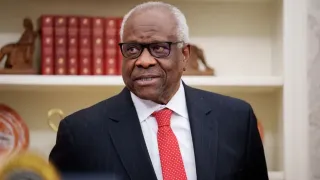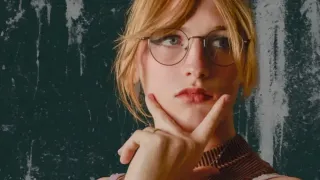November 22, 2015
Jake Heggie Goes Global
Jason Victor Serinus READ TIME: 4 MIN.
It is one measure of San Francisco-based composer Jake Heggie's success that his songs, long considered the province of American artists, have found their champions in Europe.
Thus, to a distinguished list of American recording artists that includes Frederica von Stade, Susan Graham, Jennifer Larmore, Jamie Barton, Nicolle Foland, Brian Asawa, Joyce DiDonato, Nathan Gunn, and Talise Travigne, we can now add renowned Austrian mezzo-soprano Angelika Kirchschlager. Kirchschlager's all-Heggie disc The Moon's a Gong, Hung in the Wild (Avie), a collaboration with a longtime Heggie champion, Dutch pianist Maurice Lammerts van Bueren, has the best sound quality of any Heggie recording to cross my desk.
Nor is the duo's recital the only Heggie recording issued this year. Released just in time for this review, "Jake Heggie: The Radio Hour" (Delos) features the John Alexander Singers and members of the Pacific Symphony in the world premiere recording of Heggie and Gene Sheer's new one-act "choral opera," The Radio Hour. Additional tracks include touching contributions from mezzo-soprano Graham. Also out this year is Heggie's contribution to December Celebration (Pentatone), an anthology whose capsule review will be included in our annual survey of holiday discs.
If there is any question that this "local" and very out composer has truly struck it big, one need only examine the many performances of his work here and abroad. This season's host of Heggie premieres includes the Dec. 16 San Francisco Performances West Coast premiere of "The Work at Hand," written for the fabulous mezzo Jamie Barton; the Dallas and San Diego Opera premieres of Great Scott, Heggie's second opera with Terrence McNally; and next May's Seattle/San Francisco world premiere of Out of Darkness, an opera with Sheer that explores, among other things, the devastating effect of the Holocaust on the lives of two idealistic young male lovers in 1930s Berlin.
So how do the two newest Heggie recordings stack up? Some of Kirchschlager and Van Bueren's selections have been recorded before. The delightful three-song cycle "Statuesque" (2005), for example, was set down in its original chamber version by its dedicatee, Joyce Castle, on "Flesh and Stone," a wonderful benefit CD for Broadway Care/AIDS Action that can only be ordered through their online store.
Happy to say, the European duo's version is every bit as characterful and recommendable. Kirchschlager's main strength is her ability to bring three famous statues to life through her abundant personality. She totally nails the swing of "Henry Moore: Reclining Figure in Elmwood," the different voices of Picasso and his creation in "Pablo Picasso: Head of a Woman," and the Jewish folksong melody of "Winged Victory: We're Through." The duo's renditions, like the cycle itself, are a hoot.
On a different emotional scale are Kirchschlager's eight selections from "Song to the Moon" (1998), which were created for von Stade (Flicka). Flicka may have recorded four of these songs on "The Faces of Love," Heggie's 1998 breakthrough disc for RCA/BMG that features an astounding list of Heggie champions accompanied by pianist Heggie and cellist Emil Miland, but Kirchschlager and Van Bueren duplicate only two of them. The Austrian mezzo's characterful renditions are wonderful in their own right. For those who do not have Flicka's recordings of three songs from Winter Roses, which she premiered in 2004, the European duo's rendition of "Looking West: Sweet Light" will send you to the Net to get Flicka's chamber version on Flesh and Stone.
Essential listening are Kirchschlager and Van Bueren's world-premiere recordings of three songs from "The Breaking Waves" (2011). These settings of poems by Sister Helen Prejean complement other Prejean settings that were recorded by the late Zheng Cao with Heggie and flutist Eugenia Zukerman on Flesh and Stone .
As characterful as their performances may be, Kirchschlager and Van Bueren's recital is not a total success. The mezzo goes overboard on Heggie's 1999 arrangements of "Barb'ry Allen" and "Danny Boy," making the former sound like an ill-conceived parody of Lotte Lenya singing Kurt Weill. While Kirchschlager's accent can be overlooked, the current state of her voice is of concern. Kirchschlager's softer notes are sometimes edgy, and the transition from mid-range to high is accompanied by a major operatic boost in production quality and volume that often seems at odds with the intimate content of the songs. She has developed an unfortunate tendency to hoot, and to sacrifice diction higher in the range for the sake of vocal production.
One singer to whom time has been kind is mezzo-soprano Susan Graham, 54 at the time she recorded her contributions to "The Radio Hour." Her voice retains its warmth, beauty, and ability to communicate reverence. The disc's segue from Graham's snippet of "He Will Gather Us Around" from Dead Man Walking (2000), written for her voice, to the premiere recording of the six-minute choral version (2003) is perfect. Equally recommendable are her contributions to two other world-premiere recordings of accessible choral works Patterns (1999) and I Shall Not Live in Vain (1995, rev. 1998). The latter includes a lovely handbell choir.
"The Radio Hour" 's Achilles heel is the 39-minute, three-part "choral opera." It would be nice to report that Heggie's music lifts Sheer's magical-thinking libretto beyond quasi-New Age pedestrian, but it doesn't. The title character, Nora, may find her way though the "magic door" beyond same old-same old, and "ride on waves through limitless sky" to "a bouquet of possibilities," but I couldn't help thinking that I had just been handed one more affirmation tape repeating that clicking one's ruby-red slippers three times can open the door to limitless realities.






